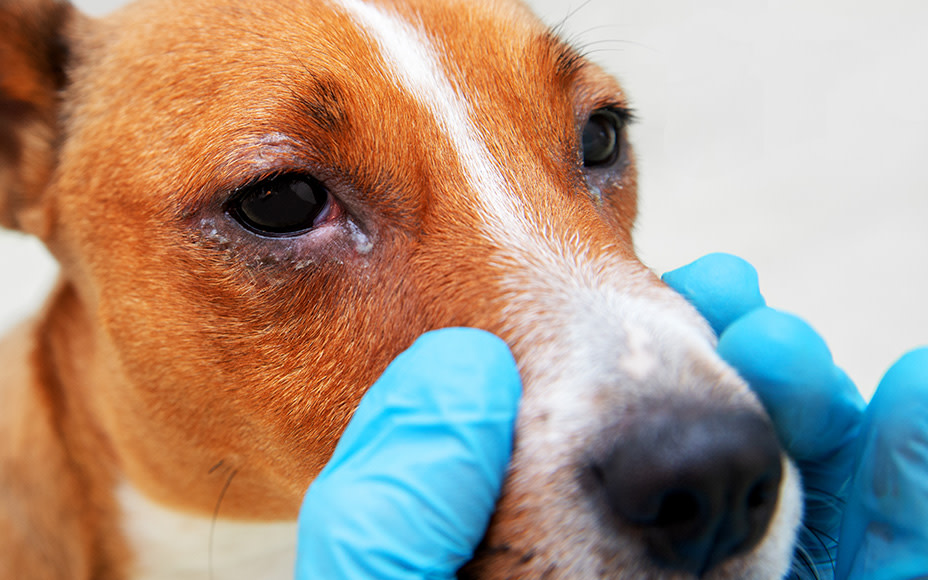Conjunctivitis is not uncommon in dogs. Learn to recognize the symptoms and help your dog.
Recognizing Conjunctivitis in Dogs – Symptoms
Conjunctivitis is not uncommon in dogs. Fortunately, the symptoms are externally visible, making it relatively easy to identify inflammation of the eye. Frequent rubbing of the eye and watery discharge are the initial signs of conjunctivitis. Additionally, pay attention to the following symptoms:
- squinting of the eye
- increased blinking
- rubbing or scratching the eye
- watery and/or sticky eye
- clear and watery or mucus to purulent yellow eye discharge
- redness in the eye
- in advanced inflammation: small blisters on the eye
Cause of the Inflammation
Before treatment can commence, the cause of conjunctivitis in your dog needs to be determined. Most commonly, dogs develop conjunctivitis due to irritation, often from a foreign body in the eye. This can be something as minor as pollen or household dust, triggering an allergic reaction in your furry friend. Strong drafts, such as those experienced during car rides, can also irritate your dog’s eyes.
Contagious conjunctivitis occurs through infection with viruses, bacteria, fungi, or parasites. In such cases, multiple animals living in the household, including your cat, may be affected.
Moreover, certain dog breeds are said to have an increased predisposition to conjunctivitis. In these cases, a genetically too small or large eyelid opening leads to eye problems. Also, if your dog has particularly long hair that hangs into its eyes, conjunctivitis may be favored.

Treatment of Conjunctivitis in Dogs
If you can identify initial signs of eye inflammation in your beloved pet, it is advisable to promptly consult a veterinarian. Just like for humans, conjunctivitis is very uncomfortable for your furry friend and is accompanied by itching and a sharp pain in the eye.
Mild Conjunctivitis in Dogs
Tailored to the cause and stage of conjunctivitis, treatment can be mild or more extensive. In the case of mild inflammation caused by, for example, drafts, quick relief can be achieved with an ointment or eye drops. Please note that you should never give your dog any eye drops or ointment from a previous occasion without consulting a veterinarian!
Severe Conjunctivitis in Dogs
If conjunctivitis is persistent, and the discharge is already yellow and purulent, veterinarians often prescribe eye drops, eye ointments, or eye gels with an antibiotic agent. In cases of inflammation caused by fungi or spores, antifungal medications are additionally administered.
(Chronic) Conjunctivitis due to Allergy
If your dog suffers from an allergy, for example, to grasses, conjunctivitis can become chronic. Medications prescribed by veterinarians can help in such cases. To avoid giving the animal medication permanently, desensitization may be worthwhile. This involves a long-term therapy in which your furry friend is gradually accustomed to the allergens causing the allergy.
Conjunctivitis due to Foreign Bodies or Parasites
Surgery is only necessary in really difficult cases. This is the case, for example, when a foreign body such as a grass awn is stuck in the eye or when a parasite such as a tick has settled in your dog’s eye. In such cases, it is strongly discouraged to try to remove the foreign body from the eye yourself! On the one hand, it can damage your dog’s eye, and on the other hand, any remaining debris in the eye may cause serious inflammation.

Is Conjunctivitis in Dogs Contagious?
Whether conjunctivitis in your furry friend is contagious to you, other people, children, or animals depends on the cause. Inflammation caused by bacteria, viruses, fungi, or parasites is contagious. For this reason, you should be particularly mindful of hygiene, always wash your hands, and separate animals living in the household if your dog has conjunctivitis. Children should also, as a precaution, keep their distance from the dog.


